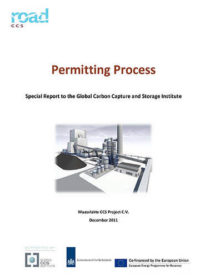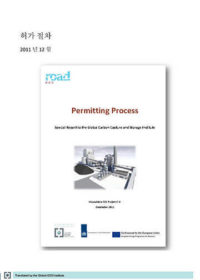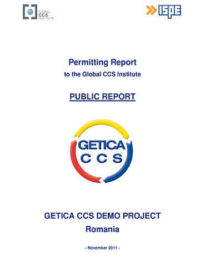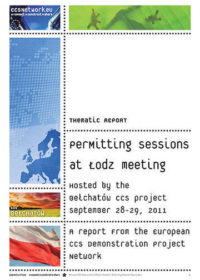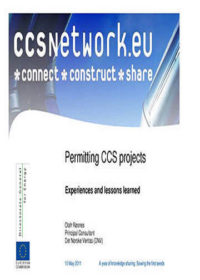Resources
Publications
Our publications, reports and research library hosts over 500 specialist reports and research papers on all topics associated with CCS.
View our Publication Library Disclaimer.
Filter by
Financing CCS
30th August 2012
Topic(s): Economics, Liability, Permitting, Policy law and regulation
In 2008, the IEA concluded that, without CCS, the cost of attaining the 50% reduction in greenhouse gas emissions by 2050, would increase by over 70% in the long term. On the basis of this, it is widely argued that investment in CCS would make the transition to a low-carbon economy substantially cheaper and more cost effective.
1. Financing CCS - Overview
This section gives an overview of the costs involved in financing CCS to reach the 2050 target and beyond.
2. Financing Strategies to Incentivise CCS in the EU
The EU approach to financing CCS is part of a broader effort to stimulate the transition to less carbon-intensive energy generation. Financial support for CCS projects consists of the following instruments:
- The European Emission Trading Scheme (ETS)
- European Energy Programme for Recovery (Regulation (EC) No. 663/2009)
- EU State Aid Legislation
Disclaimer
The content within the Global CCS Institute Publications, Reports and Research Library is provided for information purposes only. We make every effort and take reasonable care to keep the content of this section up-to-date and error-free. However, we make no claim as to its accuracy, currency or reliability.
Content and material featured within this section of our website includes reports and research published by third parties. The content and material may include opinions and recommendations of third parties that do not reflect those held by the Global CCS Institute.
Emission trading legislation and CCS
30th August 2012
Topic(s): Domestic policy, Liability, Permitting, Policy law and regulation
This section looks at emission trading legislation and CCS in the European context.
1. European emission trading legislation and CCS
The EU Emission Trading Directive has created an EU-wide scheme, which has established a market for greenhouse gas emissions allowances:
Disclaimer
The content within the Global CCS Institute Publications, Reports and Research Library is provided for information purposes only. We make every effort and take reasonable care to keep the content of this section up-to-date and error-free. However, we make no claim as to its accuracy, currency or reliability.
Content and material featured within this section of our website includes reports and research published by third parties. The content and material may include opinions and recommendations of third parties that do not reflect those held by the Global CCS Institute.
Onshore CO2 storage legal resources
30th August 2012
Topic(s): Carbon capture use and storage (CCUS), CO2 storage, Liability, Permitting, Policy law and regulation
Onshore CO2 storage legal resources considers the legislation and associated issues relating to onshore CO2 storage in Europe and Australia.
1. European waste legislation and onshore CO2 storage
This section considers the fundamental question of whether CCS processes and captured CO2 falls within the scope of EU waste legislation, and if so, what the implications would then be. Specifically we look at:
2. European water legislation and onshore CO2 storage
Here we look at European water legislation and its relationship to CCS activities including:
3. Australian onshore regulation
Here we consider how CO2 storage is dealt with at a federal and state level in Australia. At a state level we consider the state of Victoria, that enacted The Victorian Greenhouse Gas Geological Sequestration Act 2008 (No. 61 of 2008) which provides a dedicated legal framework enabling the onshore injection and permanent storage of greenhouse gas substances.
Disclaimer
The content within the Global CCS Institute Publications, Reports and Research Library is provided for information purposes only. We make every effort and take reasonable care to keep the content of this section up-to-date and error-free. However, we make no claim as to its accuracy, currency or reliability.
Content and material featured within this section of our website includes reports and research published by third parties. The content and material may include opinions and recommendations of third parties that do not reflect those held by the Global CCS Institute.
Offshore CO2 storage legal resources
30th August 2012
Topic(s): Carbon capture use and storage (CCUS), CO2 storage, Liability, Permitting, Policy law and regulation
Offshore CO2 storage legal resources covers activities relating to offshore CO2 storage in specific regions.
1. International marine legislation
This section looks specifically at current international marine legislation that may have a bearing upon the legality of CCS activities including:
2. European offshore CO2 storage
Here we look at legislation that relates specifically to the European marine environment, namely the North East Atlantic and North Sea:
3. UK offshore CO2 storage
This section looks specifically at the UK regulatory framework and the enactment of the Energy Act 2008, which is a framework for the licensing, enforcement and registration of CCS.
4. Australian offshore CO2 storage
Here we consider the regulatory framework created by the Australian Government for offshore CO2 storage based on amendments to existing petroleum legislation.
Disclaimer
The content within the Global CCS Institute Publications, Reports and Research Library is provided for information purposes only. We make every effort and take reasonable care to keep the content of this section up-to-date and error-free. However, we make no claim as to its accuracy, currency or reliability.
Content and material featured within this section of our website includes reports and research published by third parties. The content and material may include opinions and recommendations of third parties that do not reflect those held by the Global CCS Institute.
Legislation relating to CO2 transport for storage
30th August 2012
Topic(s): Carbon capture use and storage (CCUS), CO2 storage, CO2 transport, Liability, Permitting, Policy law and regulation
Here we consider the legal implications of transporting CO2 across international boundaries, for storage in marine environments, and more specifically, how CO2 transport for storage is dealt with in the European, UK and Canadian contexts.
1. International transboundary transport regulation for CO2 storage
Transport of CO2 is necessary when a suitable storage site is not close to the capture installation. During the transport phase, international law is relevant when CO2 crosses the territory of different states in order to reach the storage site. The Bamako Convention and the Basel Convention address this issue:
2. CO2 transport for storage and international marine legislation
International marine legislation has an impact upon the legal conditions for development of CCS offshore:
3. European and regional legislation on CO2 transport and storage
In a regional context, such as the European Union, transnational regulation of the transport phase is essential when CO2 is transported across the territory of different Member States in order to reach a storage site. The following legislation covers this:
4. UK laws regulating CO2 transport for storage
In the UK at present no legislation that expressly regulates CO2 transport by pipeline. The Health and Safety Executive (HSE) and the Department of Energy and Climate Change (DECC) have suggested CO2 be classified as a 'dangerous substance' or a 'dangerous fluid' and legislated accordingly.
5. Canadian laws regulating CO2 transport for storage
In Canada, there is no dedicated legislation regarding CO2 pipelines, either at federal or provincial level. Existing CO2 pipelines operate for the purpose of enhanced oil recovery (EOR) or acid gas disposal and are covered by existing pipeline legislation.
Disclaimer
The content within the Global CCS Institute Publications, Reports and Research Library is provided for information purposes only. We make every effort and take reasonable care to keep the content of this section up-to-date and error-free. However, we make no claim as to its accuracy, currency or reliability.
Content and material featured within this section of our website includes reports and research published by third parties. The content and material may include opinions and recommendations of third parties that do not reflect those held by the Global CCS Institute.
ROAD CCS permitting process: special report to the Global Carbon Capture and Storage Institute
15th December 2011
Topic(s): Carbon capture use and storage (CCUS), Permitting, Policy law and regulation
ROAD stands for ‘Rotterdam Opslag en Afvang Demonstratieproject’ (Rotterdam Capture and Storage Demonstration Project) and is one of the largest integrated demonstration projects in the world for the capture and storage of CO2, based on a new coal-fired power station located outside of Rotterdam, the Netherlands.
Because the ROAD project is the first of its kind in the Netherlands, applying for all the necessary permits is one of the most challenging parts of the project. CCS projects face complex and time consuming permitting processes linked to the implementation of the European CCS Directive and the wide range of permitting authorities to deal with. Also, because of funding requirements, time is limited to obtain all the definitive permits before the Final Investment Decision (FID) date.
In this report, the permitting process of the ROAD CCS project in the Netherlands is first described and then evaluated, starting with the description of current legal and regulatory frameworks to the specific evaluation of the ROAD’s permitting process approach. This report aims to help similar CCS projects to identify the attention points and needed conditions to get a successful permitting process.
Disclaimer
The content within the Global CCS Institute Publications, Reports and Research Library is provided for information purposes only. We make every effort and take reasonable care to keep the content of this section up-to-date and error-free. However, we make no claim as to its accuracy, currency or reliability.
Content and material featured within this section of our website includes reports and research published by third parties. The content and material may include opinions and recommendations of third parties that do not reflect those held by the Global CCS Institute.
허가 절차
1st December 2011
Topic(s): Carbon capture use and storage (CCUS), Permitting, Policy law and regulation
ROAD는 Rotterdam Opslag and Afvang Demonstratieproject(로테르담 포집 및 저장 기술 실증 프로젝트)로 세계 최대의 이산화탄소 포집 및 저장(CCS)통합 실증 프로젝트 중의 하나이다. ROAD의 주요 목표는 대규모 통합 CCS-체인의 기술적, 경제적 가능성을 실증하는 것이다.
ROAD는 로테르담의 항구와 산업 지역에서, 연소 기술을 적용하여 새로운 1,100MWe 석탄 화력발전소(Maasvlakte Power Plant 3)의 연도 가스로부터 CO2를 포집한다. 250MWe 용량의 포집 설비는 매년 백십만 톤의 CO2를 포집하는 것이 목표이다. 포집 시설은 2015년에 가동될 계획이다.
포집된 CO2는 파이프라인을 통하여 수송될 것이다: 북해에 있는 P18-A 플랫폼까지 지상 5킬로미터와 해저 20킬로미터를 건넌다. 파이프라인은 매년 약 5백만 톤을 운송할 수 있으며, ROAD는 포집된 CO2를 북해 밑의 폐가스전에 저장할 계획이다. 이 가스전들은 해안에서 약 20km 떨어진 네덜런드 대륙붕의 P18구역에 있다. 폐가스전은 북해의 해저에서 약 3,500미터의 깊이에 있고 약 3천 5백만 톤으로 추정되는 용량이 매장되어 있다.
Disclaimer
The content within the Global CCS Institute Publications, Reports and Research Library is provided for information purposes only. We make every effort and take reasonable care to keep the content of this section up-to-date and error-free. However, we make no claim as to its accuracy, currency or reliability.
Content and material featured within this section of our website includes reports and research published by third parties. The content and material may include opinions and recommendations of third parties that do not reflect those held by the Global CCS Institute.
Getica CCS Demo Project Romania: permitting report to the Global CCS Institute. Public report
18th November 2011
Topic(s): Carbon capture use and storage (CCUS), Permitting
The Romanian CCS Demonstration Project is to implement a full-chain operational CCS system capturing 1.5 million tonnes per annum of carbon dioxide (CO2) emissions from an existing 330 MW unit (no.6) of the Turceni Power Plant in Oltenia, Romania. The CO2 from the capture plant will be transported using (where possible) existing onshore natural gas pipelines and stored underground in onshore deep saline formations within a 50 km radius of the power plant.
The purpose of the Permitting Report is to identify relevant permits and competent authorities involved in the permitting process, to create a permitting map and a permitting time schedule, and to identify the authorities and the permits considered 'critical' to the development of a CCS project in Romania.
This report aims to help similar CCS projects (using post-combustion capture technology) to identify the attention points and needed conditions to get a successful permitting process.
Disclaimer
The content within the Global CCS Institute Publications, Reports and Research Library is provided for information purposes only. We make every effort and take reasonable care to keep the content of this section up-to-date and error-free. However, we make no claim as to its accuracy, currency or reliability.
Content and material featured within this section of our website includes reports and research published by third parties. The content and material may include opinions and recommendations of third parties that do not reflect those held by the Global CCS Institute.
Thematic report: Permitting sessions at Lodz meeting: September 2011
28th September 2011
Topic(s): Carbon capture use and storage (CCUS), Permitting
This report presents the discussions, conclusions and actions agreed of a thematic workshop on CCS permitting. The workshop saw participation of representatives of six out of seven members of the European CCS Demonstration Project Network, supplemented by a representative of the EC’s DG Clima and Dr. Jerry Hill from the SECARB project in the USA. The workshop was one of three parallel thematic sessions in the Network knowledge sharing event that was kindly hosted by the Bełchatów project.
Disclaimer
The content within the Global CCS Institute Publications, Reports and Research Library is provided for information purposes only. We make every effort and take reasonable care to keep the content of this section up-to-date and error-free. However, we make no claim as to its accuracy, currency or reliability.
Content and material featured within this section of our website includes reports and research published by third parties. The content and material may include opinions and recommendations of third parties that do not reflect those held by the Global CCS Institute.
What have we learnt from operational CCS demonstrations: phase 1b
1st September 2011
Topic(s): Carbon capture use and storage (CCUS), Permitting, Public engagement
An assessment of the learning that is being provided by operational, large-scale CCS (carbon dioxide capture and storage) projects around the world was undertaken by the IEA Greenhouse Gas R&D Programme (IEAGHG, 2009). This second consultation round (phase 1b) intends to add additional information to the original report on: well injectivity, regulation and permitting and public communication.
Disclaimer
The content within the Global CCS Institute Publications, Reports and Research Library is provided for information purposes only. We make every effort and take reasonable care to keep the content of this section up-to-date and error-free. However, we make no claim as to its accuracy, currency or reliability.
Content and material featured within this section of our website includes reports and research published by third parties. The content and material may include opinions and recommendations of third parties that do not reflect those held by the Global CCS Institute.
Maasvlakte CCS project: ROAD
10th May 2011
Topic(s): Carbon capture use and storage (CCUS), Permitting
Disclaimer
The content within the Global CCS Institute Publications, Reports and Research Library is provided for information purposes only. We make every effort and take reasonable care to keep the content of this section up-to-date and error-free. However, we make no claim as to its accuracy, currency or reliability.
Content and material featured within this section of our website includes reports and research published by third parties. The content and material may include opinions and recommendations of third parties that do not reflect those held by the Global CCS Institute.
Permitting CCS projects: Experiences and lessons learned
10th May 2011
Topic(s): Carbon capture use and storage (CCUS), Permitting
Disclaimer
The content within the Global CCS Institute Publications, Reports and Research Library is provided for information purposes only. We make every effort and take reasonable care to keep the content of this section up-to-date and error-free. However, we make no claim as to its accuracy, currency or reliability.
Content and material featured within this section of our website includes reports and research published by third parties. The content and material may include opinions and recommendations of third parties that do not reflect those held by the Global CCS Institute.





